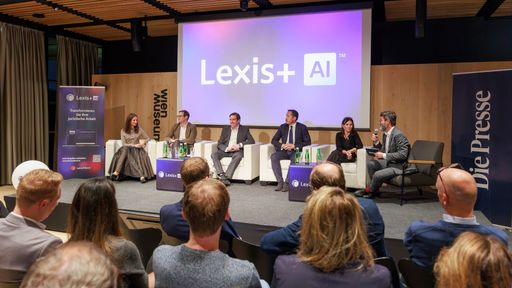At LexCon in the Vienna Museum, the who’s who of the legal and tax industry gathered to take a look at Lexis+ AI and follow a panel discussion on the topic of “Artificial Intelligence for Legal and Tax Professionals”. Moderated by Michael Köttritsch from the daily newspaper DiePresse, the discussion included Susanne Mortimore (CEO LexisNexis Austria), Markus Scheffler (Head of Product Management LexisNexis Austria), Kathrin Hagenauer (Director Content LexisNexis Austria), Dr. Alexander Scheuwimmer (President of the Austrian Lawyers’ Association and lawyer at TAIYO Legal) and Dr. Karl Stückler (tax advisor and partner at BDO) about the potential, challenges and expectations of the use of AI in the legal industry.
At the beginning, Markus Scheffler presented the new product Lexis+ AI, an AI assistant for lawyers and tax advisors. Lexis+ AI is scheduled to be available in Austria this winter and offers four key functions: intelligent chatting to answer questions in dialogue, creating drafts of legal arguments, letters, emails, clauses and memos, summarizing legal texts and analyzing your own documents.
Susanne Mortimore explained LexisNexis’ strategy to offer an ecosystem of tools for various processes in the legal industry and to integrate the possibilities of AI in all these areas. These include, for example, Lexis ContractMaster for interactive contract design, Lexis WhistleComplete as a whistleblower system, Closd for complex transactions such as M&A deals and Caselex for antitrust issues.
In the subsequent discussion, expectations and concerns surrounding the use of AI in law were discussed. Dr. Stückler emphasized the importance of reliable content and the traceability of the answers generated by AI. He wanted an AI that could be relied on. At least it should be understandable how the answers come about and on which sources they are based.
Kathrin Hagenauer explained that they are also pursuing a scientific approach to quality assurance of the AI outputs and are working with the WU Legal Tech Center. The goal is to provide reliable answers and content to provide legal professionals with the best possible support. It was also mentioned that LexisNexis is cooperating with Stanford University to develop uniform quality standards and measurement criteria for legal AI.
Susanne Mortimore emphasized the importance of transparency, openness and compliance with guidelines for responsible AI according to the EU AI Act. LexisNexis already has internal policies that include basic requirements of the AI Act such as explainability, human oversight, data protection and the avoidance of bias in data. You can also get know-how from digital experts like lawyer Dr. Axel Anderl from Dorda.
According to Dr. According to Scheuwimmer, the training of lawyers will have to change fundamentally. You will also need to learn technical skills such as proper prompting. It must be avoided that at a certain point in time the young generation will no longer be able to control the AI results. This can either be because they lack the experience themselves (plausibility check) or the ability to research. The President of the Austrian Lawyers’ Association also addressed professional law issues. From a practical perspective, he described the quality and quantity of required review of AI outputs, attribution, and whether AI performance could constitute grounds for reinstatement. The general regulations, in particular regarding proper office management, can and must be applied here until there are special regulations for AI.
The majority of those present were optimistic that AI can meaningfully support the work of lawyers and tax advisors and take over routine tasks, leaving more room for creative, strategic and advisory activities. A survey was presented according to which 66% of US corporate lawyers surveyed find it positive if their law firms use generative AI. However, only 33% of law firms believed that their corporate clients viewed this positively. The expectations between companies and law firms have not yet been coordinated here. According to another study, 90% of law firms and in-house counsel in the US want to increase their spending on generative AI in the next five years. A Large Law LexisNexis Commercial Preview survey in the US in November 2023 found that lawyers save up to 5 hours per week by using Lexis+ AI for legal research and summaries.
Following the discussion, there was a live demo in which concrete use cases of the Austrian implementation of Lexis+ AI were presented. Visitors had the opportunity to try out the tool and ask questions to the LexisNexis experts. Further information about Lexis+ AI can be found at www.lexisplusai.at.
